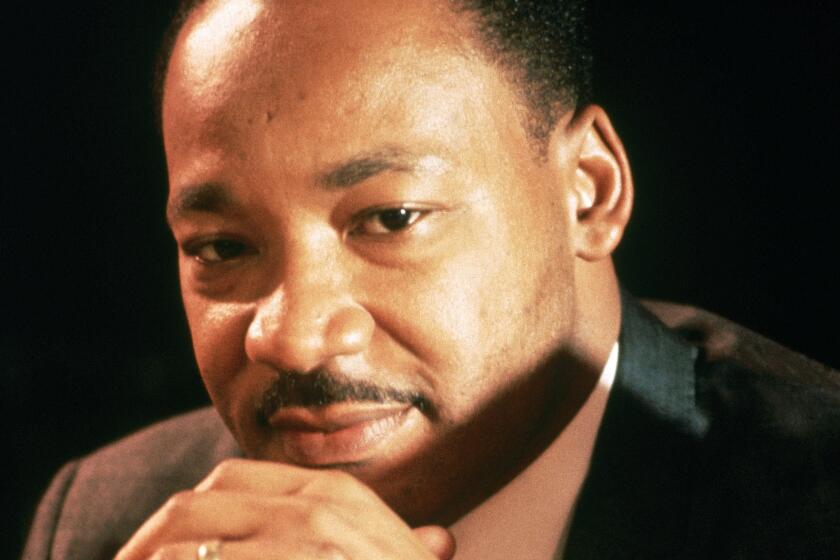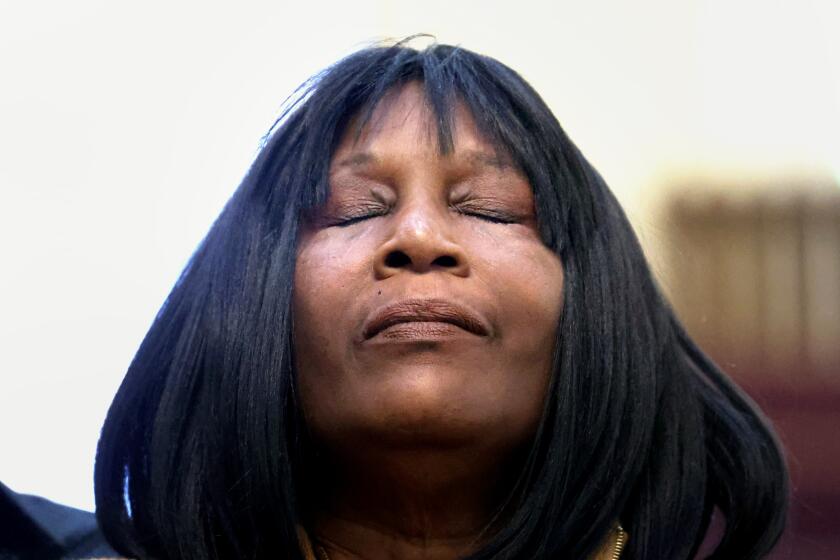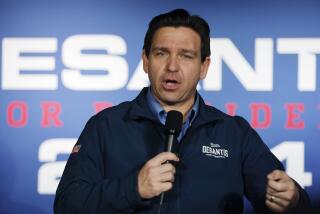Essay: Republicans are trafficking migrants to California. Are we too tired to protest?

June already has its share of monthly observances, including Pride, ALS awareness and African American Music Appreciation. Let me add one more to the list: It should be National Vigilance Month.
There is Juneteenth this month, of course, Monday’s holiday celebrating African Americans’ final emancipation from enslavement. And three summers ago, we had the all-too-brief rebellion against racism and police brutality in the wake of a terrible few months filled with Black death. Both arrived at historical moments when America had a choice to either collectively progress towards racial equity or remain true to its bloody roots.
I’m reminded now of something that a policing expert told me when I wrote about Juneteenth three years ago, as the uprising was swelling around the world. Speaking about emancipation, he told me “it took so much blood and so much treasure that the nation was too exhausted to stay focused on what you do to actually build freedom.” He touched upon what I sense looking at today’s America. Folks are tired. I know I am.
Truth is, the Republican war on “woke” is wearing me out. Conservatives have been attempting to revise the English language, changing the meanings of terms such as “critical race theory” to suit their worldview. In that war, their most aggressive campaign may be against the word “woke,” a term meant to inspire social action and vigilance in a nation rife with hatred for people based simply upon who we are. It means, quite literally: stay awake. Racism, and all other bigotries, is oriented not merely towards dehumanization, discrimination and violence. They are designed to make us tired. If anything, this month should remind us that none of us can afford to be too exhausted to build a better nation.
I saw hints of such exhaustion in Pew’s new survey of more than 5,000 Americans. Released Wednesday, it finds that the 67% overall national support for Black Lives Matter that we saw during June 2020 is now down to barely half. This follows a trend Pew has observed since September 2020, when support started to drop.
The results break down predictably along racial and partisan lines, but the poll lays most of the responsibility at the feet of one group in particular. “The decrease in overall support is mostly due to the declining share of white adults who say they support the movement,” the report reads.
That particular movement is now 10 years old, and yet less than a third said they understand the goals of Black Lives Matter “extremely” or “very” well. About the same percentage, only 32%, agreed BLM is “highly effective at bringing attention to racism against Black people.”
Perhaps Pew’s poll question may be too specific. By focusing on BLM, it belies the expansive nature of our national introspection following George Floyd’s murder in 2020. That uprising was less about the organization Black Lives Matter than the meaning of those three words, and seeing them realized in policy. What erupted in response to a murder committed by a cop grew to examine, among other things, racial inequities in medicine made clear by the mounting and disproportionate COVID-19 death toll.
Martin Luther King Jr. Day is supposed to honor a man and cause that were all about making this country uncomfortable. The opposite is happening.
Despite the languishing support, these numbers might make some optimistic. We’ve been subject to incessant disinformation campaigns originating from the political right, from lying about urban crime rates to targeting funding for diversity initiatives. Rather than make a case for their policies to voters who aren’t likely to support them, Republicans, led by the disgraced former President Trump, have demonstrated that they’ll just try to erase us. They’ve criminalized our history, attempted to ban books and threatened librarians and teachers. All the while, they had the nerve to lead a negative political campaign against the very idea we should remain watchful of such actions.
Rather than not doing the racism or, even better, trying to end it, Republican leaders by and large would rather have us believe it isn’t a problem. Yet despite all their efforts, half of respondents still view Black Lives Matter favorably.
As nice as that may be, I see both this poll and this moment in America differently. Is this the floor for America’s support for Black and brown safety and liberation, or are we at risk of sinking further?
Ron DeSantis may hold the answer to that question.
The governor of Florida is running against the wind. His nascent presidential campaign isn’t going well. He is being nearly doubled up in polling by Trump, currently a criminal defendant in two different courts. On top of that, the acolytes of said defendant consider DeSantis Enemy No. 1, seemingly above President Biden. Or Black Lives Matter, even. (Perhaps that’s going too far.)
It’s early, so things could change. Barring any surprising developments, though, it is difficult to see DeSantis’ path to the nomination. But I’m not celebrating his flailing campaign. That he has made it this far with his politics of malevolence speaks ill of our nation’s direction.
DeSantis presents as the more competent version of the former president, but he is more a cosplayer than an evolution. Without the veneer of celebrity, all that remains is the cruelty.
In addition to banning gender-affirming care for trans youth, signing a “bathroom bill,” and criminalizing drag performances, DeSantis also picked a fight with Disney over his discriminatory “Don’t Say Gay” law, costing Floridians thousands of jobs. He signed a six-week abortion restriction that was extreme even by his party’s standards. He mismanaged Florida during the COVID-19 pandemic so badly that it seemed to be on purpose, encouraging residents and visitors alike to ignore safety protocols as Black and Latino Floridians remained disproportionately affected.
Most recently, his administration and its contractors deceived three dozen migrants and flew them to California as fodder to make a cheap political point. For context, DeSantis had just signed four human-trafficking bills into law, promising with no apparent sense of hypocrisy “to use every resource at our disposal to put human traffickers out of business and into jail.” (He himself may be guilty of violating kidnapping laws, as Gov. Gavin Newsom intimated on the day the second plane landed in Sacramento.)
His partner-in-possible-crime, Texas governor Greg Abbott, joined DeSantis last year in shipping migrants to both Martha’s Vineyard and the residence of Vice President Harris in Washington. Abbott just did it again, busing 42 migrants from Texas to Los Angeles on a day-long trip without any food or water.
Recklessly placing people in physical jeopardy is what we’ve come to expect from Republican governance. It is no wonder that three civil-rights organizations recently took the very rare step of issuing travel advisories for anyone in their constituencies traveling to Florida.
The LGBTQ+ rights organization Equality Florida was the first, warning “of the risks posed to the health, safety, and freedom of those considering short or long term travel, or relocation to the state.” (The Human Rights Campaign soon joined them.) The League of United Latin American Citizens issued theirs in early May, cautioning Latinos ahead of the July 1 enactment of legislation that DeSantis’ office trumpeted as “the strongest state-led anti-illegal immigration bill ever brought forth.” The NAACP’s warning came days later, shortly before DeSantis announced his presidential campaign. It was, in the organization’s words, a “direct response to [DeSantis’] aggressive attempts to erase Black history and to restrict diversity, equity, and inclusion programs in Florida schools.”
Both the NAACP and LULAC have been around since the early 20th century and DeSantis provoked only the second such caution either organization has ever issued. This alone should be warning enough, but it isn’t.
Republicans have been campaigning and governing with bigotry since well before I was born. It has been a winning message, but whether it is for DeSantis is besides the point. Rather than his electoral prospects, I think primarily of the damage he has done as a governor, and can do as a presidential candidate.
What is actually useful, though, is examining why his electoral prospects may be suffering. The Pew numbers depict a nation that saw civil rights as a summer fad three years ago but also doesn’t like being viewed as the villain. It never does.
America remains that guy who never thinks he has committed a foul. That’s evident in every excuse made by the nation’s apologists for its lengthy list of human rights abuses, both here and abroad. So many Americans are content voting for terrible outcomes, but heaven forbid they are ever associated with those outcomes.
Consider that while metastasizing actual racial hatred, the collective view of it is so negative that conservatives have repurposed the word “racism” to allege that white people are its true victims.
That’s why it’s a time for vigilance. DeSantis and his lot may hate that the term “woke” exists, yet people like them are why it exists. DeSantis and company assert we don’t need that vigilance, likening it instead to a virus. That is not just bigotry. They’re gaslighting the entire American public, and they’re limiting the very potential of the country itself.
What do you hear when you see video of Tyre Nichols calling out for his mother in successive tearful bursts. Do you hear someone’s son? Do you hear your own child?
The GOP will keep doing what it does, but what will we voters tolerate? How do we treat candidates who thrive on the kind of cruelty and strongman talk that DeSantis and others continue to engage in?
Let’s be stereotypical Californians for a moment and focus primarily on ourselves. Recall that earlier this month, our state was the place DeSantis and his officials opted to steer a group of misled asylum-seekers, dumping them in the capital in a sick publicity gambit.
Why aren’t protesters taking to the streets? Why aren’t Americans more conspicuously furious about what DeSantis has done? Is it because the anger didn’t seem to matter last time? Much like the uproar after a mass shooting, are we only awakened when someone’s life ends? Has the right’s constant, mind-numbing dehumanization somehow made us all less human? Or are we just too tired?
More to Read
Sign up for Essential California
The most important California stories and recommendations in your inbox every morning.
You may occasionally receive promotional content from the Los Angeles Times.













